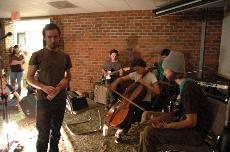For fans of experimental indie, rootsy folk rock, and psychedelic pop, the WQFS-sponsored show held Feb. 22 in The Underground turned out to be a true sensation. The bands were, in order of appearance, Dead Elephant Bicycle, Health, and Dr. Dog. The Philadelphia psychedelic pop outfit, Dr. Dog, was the headlining act.
After a nice leisurely sound check, the full five-piece assemblage of Dead Elephant Bicycle took to the stage. Fitting the profile of an artsy, idiosyncratic indie band, the group looked rather hopeful at first, as everything from their attire to their unconventional array of instruments, which included a trumpet, a cello and a mellotron, seemed to be full of promise.
However, promise and words of its ilk that generally connote good feelings may be misplaced when used in reference to the music of Dead Elephant Bicycle. While singer Dylan Angell’s lyrics were compelling, their unflinching bleakness may have been a little draining on the serotonin stores of the average listener, especially in songs like “Drunken Child.” Opting for a kind of funerary minimalism, the musicians didn’t so much play their instruments as lament over them. And indeed, as their set limped on, piling one dirge on top of another, members of the audience may have begun to feel as though their psyches were being rolled over repeatedly by yes, a dead elephant riding your pouty 14-year-old sister’s broken Huffy.
I watched the set from one of the benches towards the back. It was there that I was fortunate enough to meet the one person in the audience who was qualified to help me comprehend the ominous otherworldliness of this band – the venerable “Doctor” Caleb Gardener, music connoisseur.
“Dead Elephant Bicycle is experimental, so they generally don’t fit easily into a category,” said Gardener, “but if you must call them something, it would be Post- Americana.”
Post-Americana, eh? A glossary of musical jargon might be useful at this point.
“I’d say that they were heavily influenced by Joan of Arc and The Rachels,” said Gardener. “Put that in your story; they’d like the comparison.”
To be fair, Dead Elephant Bicycle was admirable for their intriguing mixture of narrative and gloom, as their performance made for an altogether haunting experience that few groups are able to match. Appropriately enough, they also covered a Tom Waits song towards the end of their set. Like most of their songs, however, it was received with polite, but subdued applause.
“I couldn’t understand what the guy was saying,” said first-year Jonathan Richter after their set, “and now I think I’m feeling a little depressed.”
The next band to take the stage was Health, serving a breath of fresh air with their rootsy, honest folk rock. Instantly, the composition and disposition of the audience changed as Shaina Machlus , the WQFS organizer, cheerily bid everyone to stand saying that “this is the kind of music you’re going to want to get up and dance to!”
And indeed, spirits were raised and legs were stretched as lead singer Jonathon Moore led the band through their set of bouncy, openhearted rockers with his warm Midwestern-sounding voice that belied his Maryland origins. As said on the band’s MySpace, “Health is real American music,” putting them in a league with other no-frills acts like Wilco, The Jayhawks, and The Black Crowes. Ideal for midsummer highway coasting to no place in particular, their music invoked all that is wide-eyed and wonderful.
Health’s members first met as undergrads at Guilford College, and in the spirit of the school, their music is at times openly egalitarian. Take for instance the painfully short “I Do” (available for listening at myspace.com/healthyportions) which, half way through, turns into a soaring call-and-response dialogue between Moore and bass player Mark Wingfield.
Where’re you from? . I’m from around.
Whatcha done? … Walked on the ground.
Who do you like? . Folks that I meet.
Who do you meet? . People on the street.
I had planned to conduct at least a semi-formal interview with members of the group after the set; however, the unexpected struck in the form of Mr. Haling W. Dwang, self-described sculptor of potpies. His work, he says, is most comparable to that of photo-realistic artist Chuck Close.
“Some of the potpies are open; some of them are intact,” said Dwang, “It sounds weird, but when you’re in a helicopter and you’re looking at my work, it’s (right) on.”
Mr. Dwang answered for the band when they felt they could not and claimed that his personage alone has served as the primary influence on Health. Moore and keyboardist Anna Murray could only nod humbly in agreement.
The third and final act, Dr. Dog, was also the most anticipated. Having opened for acts such as The Raconteurs (Jack White’s other band), Dr. Dog has garnered considerable success thus far, and undoubtedly has much still to come. In fact, they managed to land a spot on Late Night with Conan O’Brien for Monday, March 12. This may be due in part to their irresistible style of catchy, yet sophisticated, pop melodies that unfold in the kaleidoscopic fashion of “Sgt. Pepper’s”-era Beatles, complete with vocal harmonies that rival The Beach Boys or The Zombies at times.
Of Montreal also came to mind for many listeners. However, unlike Of Montreal, Dr. Dog’s canon is refreshingly devoid of long-winded song titles. While cheery psych-folk numbers like “My Old Ways” seem to bear the bands signature sound, songs like The Jackson 5-esque “The Worst Trip” and the mellow countrified strummer “California” show that Dr. Dog is a band that is in a continual state of evolution.
“They played really happy music,” said first-year Anne Marie Drolet, attesting to the concert’s about-face from start to finish. The evening certainly ended on a positive note.

